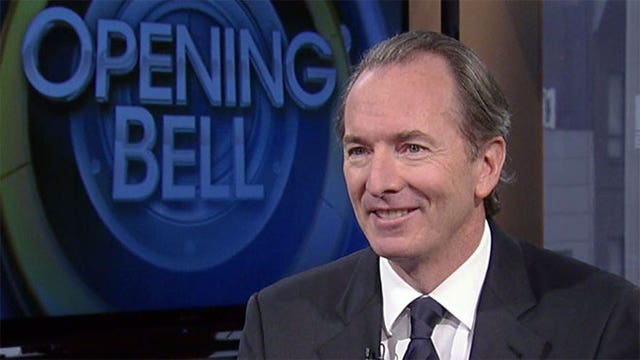Morgan Stanley's Gorman Remains 'Very Bullish' on U.S. Economy
Despite jitters about a winter slowdown, Morgan Stanley (NYSE:MS) CEO James Gorman is very bullish on the U.S. economy and stock market, especially compared with challenges in emerging markets like China.
“I think we are now recognizing the U.S. economy is strong and getting stronger. That’s obviously very positive for the markets,” Gorman told FOX Business's Maria Bartiromo in a wide-ranging interview on 'Opening Bell' Monday.
His comments come as Wall Street celebrates the five-year anniversary of the start of the bull market that has carried the Dow Industrials almost 10,000 points from their crisis lows.
“If you look at the macro environment, I remain very bullish. The upside risk is the U.S. economy. It’s taken a while for people to get comfortable with that,” said Gorman, who noted “scar tissue from the crisis” continues to linger.
The Morgan Stanley chief executive cited a number of factors behind his rosy outlook, including improved U.S. growth, rising CEO confidence, diminishing consumer debt, strong corporate balance sheets and recapitalized banks.
“The system is working well. It doesn’t surprise me the markets are performing,” said Gorman.
He also noted that unlike during the dot-com bubble and pre-crisis period of 2005-2006, retail investors have not blindly rushed into stocks, driving valuations out of whack with fundamentals.
“This has been a very mature and sober retail investor. I think there’s room to play here. The retail investor is simply responding to the economic fundamentals,” Gorman said.
While the Morgan Stanley exec sounded optimistic about the U.S., he expressed more caution about China, which has seen its economy slowdown in recent quarters from the double-digit growth investors had become accustomed to.
'Bumps in the Road'
“The downside risk to global markets is China’s economy,” he said. “China is moving from an export-led economy to a demand-driven consumer led economy. That’s a massive transition…There are going to be some bumps in the road.”
Still, Gorman believes China will be able to maintain growth of 6.5% to 7%.
Like many on Wall Street, Gorman is excited about the recent push to improve Japan’s economy, which has been mired in a deflationary spiral for decades.
“[Who would have thought] Japan would go through an economic resurgence? Nobody thought that. For the last 30 years, things have been moribund,” he said.
Gorman said he is not surprised Japanese markets “got ahead of themselves a little bit” last year given the excitement over Prime Minister Shinzo Abe’s economic reforms.
Still, the Morgan Stanley CEO believes investors now have to wait for real change in the country’s economic structure through major reform in the areas of health care, education and immigration.
Dividend Hike Ahead?
Meanwhile, Morgan Stanley investors are anxiously awaiting the results of the Federal Reserve’s so-called stress tests later this month. As part of the exams, regulators bless or reject banks’ plans to return capital to shareholders through share buybacks and dividends.
Gorman said he wouldn’t describe Morgan Stanley’s requests as “aggressive or conservative,” only saying: “We’ve done what we think is right.”
He also declined to give specifics on when a possible dividend increase may occur. “Morgan Stanley has clearly recovered from the crisis and is moving forward with great strength. Now we want to make sure we’re managing our capital reflective of that,” said Gorman.
Gorman, who became CEO in 2010, noted a number of changes Morgan Stanley has made to adjust to tighter regulation, including shrinking its balance sheet to $800 billion from $1.25 trillion and raising liquidity to $200 billion from $80 billion.
The Wall Street firm has also shut various hedge fund businesses as well as its proprietary trading desk.
“We’ve made enormous changes to the way we operate. We’re ready for the future,” the Australian-born executive said.
Morgan Stanley expects its deal advisory business to continue to benefit from increased M&A and IPO activity, which Gorman believes will pick up in the next 24 months.
“This is the time to make your strategic moves,” he said.
Gorman also weighed in on the craze surrounding Bitcoin, the crypto currency that has seen its value slide in the wake of the bankruptcy of major exchange Mt. Gox.
“I’m not sure I understand it…There are so many moving parts,” he said. “I would think and hope the regulators are paying a lot of attention to it.”




















